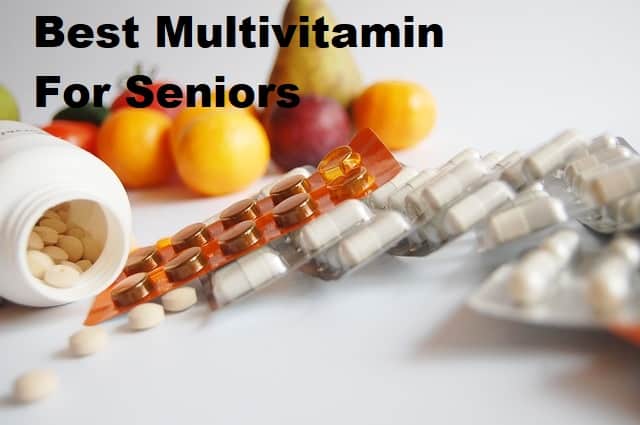Hello friend! In this post, you will learn about the best multivitamin for seniors and if they are actually worth the money and something you should invest in.
Multivitamins are probably the most common supplement people take and it’s very likely you have used them at some point before.
There is a lot of controversy concerning the use of vitamins. Many people swear by them but many medical professionals think they are a waste of money if your diet is in check.
Aging and diseases can affect nutrient absorption, leading to deficiencies but more often people turn to multivitamins “just in case” or to get a little boost for age-related fatigue.
So it’s not surprising that up to 70 percent of people age 65 or older take some form of vitamin or mineral supplement regularly.
What might be surprising is that the benefits of multivitamins aren’t actually based on scientific evidence and in some cases they might even be harmful to your health.
That’s why it might not be wise to eat multivitamins “just in case”. Seniors should always talk to a medical professional before introducing a multivitamin or any other dietary supplement.
All that said, in some cases, an occasional high-quality multivitamin might be beneficial if your diet is not optimal. Read on to find out more about multivitamins for seniors.
What Are Multivitamins
Multivitamin is any kind of vitamin supplement that has more than one type of vitamin in it which makes the different from vitamin D or vitamin B supplements for example.
Multivitamins often have the most important micronutrients and minerals you need to get from your diet. Micronutrients aren’t actually vitamins, but the idea with most multivitamins is to offer all the important nutrients you might not get from your diet.
So what exactly are vitamins? Vitamins are organic molecules that your body needs to function properly. Essential vitamins cannot be synthesized by the body so they need to acquirer from the diet.
Vitamins have many functions and they are not all similar to each other. Some are water-soluble and some are fat-soluble for example.
Some vitamins can be synthesized by the body under the right circumstances, like is the case with vitamin D for example. Vitamin D can be synthesized on the skin with the help of sunlight.
If you live up north, you will likely not get enough sunlight for your body to produce enough vitamin D, so you have to get it from the diet.
Vitamins C and vitamin B (actually a large group of vitamins) have to be in the die consistently because they are water-soluble and cannot be stored in the body even though they are very crucial for your health.
Besides vitamins, there are three other groups of essential nutrients: essential amino acids (protein), essential fatty acids (like omega 3), and minerals.
Multivitamins often include minerals since they are needed in trace amounts and they are easy and cheap to include in the pills. These include zinc, iron, manganese, chrome, and many others.
Are Multivitamins Beneficial
So are multivitamins actually beneficial? Let’s look at what the research says.
Johns Hopkins Medicin recently did a review on the scientific evidence about supplements, including multivitamins. The review included three recent studies on the effects of vitamins, one involving 450,000 people. The conclusion was that multivitamins are not very effective and can even be harmful:
“The researchers concluded that multivitamins don’t reduce the risk for heart disease, cancer, cognitive decline (such as memory loss and slowed-down thinking), or an early death. They also noted that in prior studies, vitamin E and beta-carotene supplements appear to be harmful, especially at high doses.” – Johns Hopkins Medicine
Then again, a paper from 2014 concluded that nutrient deficiencies occur, the typical American diet is far from optimal and that the potential benefits of multivitamins might overweight any risk in the general population and might be especially beneficial for older people.
It seems that the benefit of multivitamins boils down to if you have any vitamin deficiencies. If your diet is diverse and you don’t have any medical conditions that affect nutrient absorption, multivitamins will likely not offer any significant benefit.
Some vitamins might even be harmful to your health in higher dosages like seems to be the case with vitamin E and beta-carotene.
But if your diet is less than optimal, the potential benefits of multivitamins might outweigh any risk associated with them. Especially if you consult medical professionals before their use.
Do You Need Multivitamins
So do you actually need multivitamins? It all boiled down to your diet. If you eat a monotonic diet that consists mainly of processed foods, multivitamins might have some benefit to you.
That said, it’s always better to get your vitamins from real food as we established in the previous chapter.
If you eat a diverse diet that consists of healthy proteins like lean meats, poultry, tofu, and other soy products, beans, lentils, whole grains, and a lot of vegetables you very likely don’t need a multivitamin.
If you are unsure of your nutrient status, I recommend you talk to your doctor about and you can also consult a nutritionist. They are medical professionals that can assess your diet and check your vitamin status.
If your diet consists mainly of processed foods or you eat a very monotonous diet, a multivitamin might offer some benefit. But remember that real food is always the better option like we talked about in the previous chapter.
Types Of Multivitamins
There are literally thousands upon thousands of different kinds of multivitamin products on the market and you can find them in any store or pharmacy.
Different multivitamins will have different amounts and concentrations of vitamins and minerals but there are basically two types of multivitamins: Synthetic and organic.
Synthetic multivitamins are typically small pills that contain synthetically (i.e. in a lab or factory) produced vitamins and minerals and very little filler. This makes them very efficient and safe, you know exactly what you are getting.
Organic multivitamins are made by compressing natural plant sources that are typically larger and have smaller concentrations of vitamins in them, so you might need to take several of them to achieve the recommended
While normally our body cannot tell if a chemical is synthetic or organic if its molecular structure is identical with vitamins it’s a bit different. Vitamins never occur alone in nature, they are present with other organic compounds that affect their absorption. These are called co-factors.
Organic vitamins include many of these cofactors since they’ve been made mostly from real plant material. Essentially they resemble food more than pharmaceuticals.
Best Multivitamin For Seniors
If after all this information you have concluded want to try a multivitamin I recommend you choose an organic vitamin with good reviews.
You can find tons of easy-to-order organic vitamins on Amazon (That’s an affiliate link to Amazon, meaning I will earn a small commission if you decide to buy. Helps to keep the site running!) if you are comfortable with buying online.
When selecting a product I find it best to look at the lowest ratings in reviews, they often tell more about the potential issues of the product and you can be sure they are honest opinions and not paid marketing.
All that said, I think the best multivitamin for seniors is food. Real, nutritious, whole food. It takes a bit of planning and learning but a healthy diet doesn’t have to be expensive or arduous.
So I recommend you save the money on multivitamins and invest in real food instead. It’s a lot more enjoyable as well than eating pills!
Conclusion
I hope you found this post about the best multivitamin for seniors useful. If you have any questions leave them in the comments section below and I will get back to you.
Multivitamins are very popular among seniors but the current scientific understanding is that they are rarely beneficial. If you have a monotonic diet you might benefit from one.
It’s still important to talk with your doctor about the potential interactions or contraindications for multivitamins before introducing them into your diet.
Optimally, you should aim to eat a diverse diet with a lot of vegetables, lean proteins, healthy fats, and whole grains since real food is superior to vitamin pills.
If you do decide to try a multivitamin, I recommend you choose an organic multivitamin that resembles real food and has most of the cofactors that are crucial for absorption.
Thanks for reading and see you next time!

